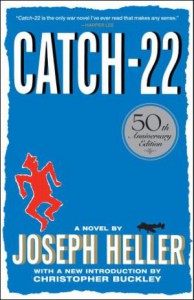
this book is many contradictory things - funny and tragic, obnoxiously and beautifully written - including both easy and hard to read. it is definitely slow going, especially the first third or so. i won't say that it's worth plowing through, although i think it is, but that's asking a lot of people who really might not be able to take his writing. the writing itself is really repetitive, and he makes the same few points over and over again throughout the book. and the story itself is hard to follow as it's (almost) completely nonlinear, so the reader often has no idea what is going on, or even who is alive at this point in the telling.this is a book about war. after reading this book for the first time many years ago, and then reading another of his books (something happened - in which nothing happens, by the way) i had come to the conclusion that heller is not a good writer. with this reread i really question that analysis. i think he might be brilliant, actually. i think i should give him the benefit of the doubt, and assume that all he did, he did on purpose. that said, all of the circular and annoying writing in this story served to make his point. this is a book about war. his points about the people in charge of this war on the ground, and about war itself, were communicated through this kind of writing. the futility of the war effort (this is wwii and the allies are soon to win, this regiment's actions mean little), the runaround the superior officers give everyone, the mundane-ness of the war for soldiers there day after day - it's all so well explained through the writing that is hard to tough out. as war should be. i really do think this is his point. how much this sucks. he didn't want it to be easy for us to read a book about how awful it is for everyone to be there. and these pilots were sent again and again on these missions, repeating flight patterns and bombing targets, in the same way that we, as readers, were made to push through circular conversations and repetitive writing. i thought this was bad writing the first time, now i think it's purposeful, and quite poignant.two other points. i think it's really significant - for the soldiers and for the readers - that throughout this book about war, the characters try to stay alive. as they die one by one, we are told next to nothing about that death, about what it looks like or feels like, save for one exception (the first death chronologically but the last that we read about). i find this unusual in books, to give so little detail about something so important. so i also think this is on purpose, and goes to his points about war and the psychology of people made to be in war. also, the satire and hyperbole he uses when talking about the officers and the people making decisions in orchestrating the offensive is pretty extreme. i hope that his point about corruption, etc, was never true in our armed services. i have little faith in the military-industrial complex, but i (naively?) believe that those people in charge of keeping our soldiers alive are trying to do that, even while engaging in battle.i feel like i should stop babbling; this is a book i think i could talk about for a while. i'll just get to the quotes...an example of the circular mentality and one of the many "catch 22"'s we read about:"Group Headquarters was alarmed, for there was no telling what people might find out once they felt free to ask whatever questions they wanted to. Colonel Cathcart sent Colonel Korn to stop it, and Colonel Korn succeeded with a rule governing the asking of questions. Colonel Korn's rule was a stroke of genius, Colonel Korn explained in his report to Colonel Cathcart. Under Colonel Korn's rule, the only people permitted to ask questions were those who never did. Soon the only people attending were those who never asked questions, and the sessions were discontinued altogether, since Clevinger, the corporal and Colonel Korn agreed that it was neither possible nor necessary to educate people who never questioned anything."from the doctor:"'I used to get a big kick out of saving people's lives. Now I wonder what the hell's the point, since they all have to die anyway.'""'Anything worth living for,' said Nately, 'is worth dying for.'""'And anything worth dying for,' answered the sacrilegious old man, 'is certainly worth living for.'"if you've gotten this far in my review, maybe you'd like to read a much better one, a brilliant one, actually, about this book:http://www.goodreads.com/review/show/30114285
 this book is many contradictory things - funny and tragic, obnoxiously and beautifully written - including both easy and hard to read. it is definitely slow going, especially the first third or so. i won't say that it's worth plowing through, although i think it is, but that's asking a lot of people who really might not be able to take his writing. the writing itself is really repetitive, and he makes the same few points over and over again throughout the book. and the story itself is hard to follow as it's (almost) completely nonlinear, so the reader often has no idea what is going on, or even who is alive at this point in the telling.this is a book about war. after reading this book for the first time many years ago, and then reading another of his books (something happened - in which nothing happens, by the way) i had come to the conclusion that heller is not a good writer. with this reread i really question that analysis. i think he might be brilliant, actually. i think i should give him the benefit of the doubt, and assume that all he did, he did on purpose. that said, all of the circular and annoying writing in this story served to make his point. this is a book about war. his points about the people in charge of this war on the ground, and about war itself, were communicated through this kind of writing. the futility of the war effort (this is wwii and the allies are soon to win, this regiment's actions mean little), the runaround the superior officers give everyone, the mundane-ness of the war for soldiers there day after day - it's all so well explained through the writing that is hard to tough out. as war should be. i really do think this is his point. how much this sucks. he didn't want it to be easy for us to read a book about how awful it is for everyone to be there. and these pilots were sent again and again on these missions, repeating flight patterns and bombing targets, in the same way that we, as readers, were made to push through circular conversations and repetitive writing. i thought this was bad writing the first time, now i think it's purposeful, and quite poignant.two other points. i think it's really significant - for the soldiers and for the readers - that throughout this book about war, the characters try to stay alive. as they die one by one, we are told next to nothing about that death, about what it looks like or feels like, save for one exception (the first death chronologically but the last that we read about). i find this unusual in books, to give so little detail about something so important. so i also think this is on purpose, and goes to his points about war and the psychology of people made to be in war. also, the satire and hyperbole he uses when talking about the officers and the people making decisions in orchestrating the offensive is pretty extreme. i hope that his point about corruption, etc, was never true in our armed services. i have little faith in the military-industrial complex, but i (naively?) believe that those people in charge of keeping our soldiers alive are trying to do that, even while engaging in battle.i feel like i should stop babbling; this is a book i think i could talk about for a while. i'll just get to the quotes...an example of the circular mentality and one of the many "catch 22"'s we read about:"Group Headquarters was alarmed, for there was no telling what people might find out once they felt free to ask whatever questions they wanted to. Colonel Cathcart sent Colonel Korn to stop it, and Colonel Korn succeeded with a rule governing the asking of questions. Colonel Korn's rule was a stroke of genius, Colonel Korn explained in his report to Colonel Cathcart. Under Colonel Korn's rule, the only people permitted to ask questions were those who never did. Soon the only people attending were those who never asked questions, and the sessions were discontinued altogether, since Clevinger, the corporal and Colonel Korn agreed that it was neither possible nor necessary to educate people who never questioned anything."from the doctor:"'I used to get a big kick out of saving people's lives. Now I wonder what the hell's the point, since they all have to die anyway.'""'Anything worth living for,' said Nately, 'is worth dying for.'""'And anything worth dying for,' answered the sacrilegious old man, 'is certainly worth living for.'"if you've gotten this far in my review, maybe you'd like to read a much better one, a brilliant one, actually, about this book:http://www.goodreads.com/review/show/30114285
this book is many contradictory things - funny and tragic, obnoxiously and beautifully written - including both easy and hard to read. it is definitely slow going, especially the first third or so. i won't say that it's worth plowing through, although i think it is, but that's asking a lot of people who really might not be able to take his writing. the writing itself is really repetitive, and he makes the same few points over and over again throughout the book. and the story itself is hard to follow as it's (almost) completely nonlinear, so the reader often has no idea what is going on, or even who is alive at this point in the telling.this is a book about war. after reading this book for the first time many years ago, and then reading another of his books (something happened - in which nothing happens, by the way) i had come to the conclusion that heller is not a good writer. with this reread i really question that analysis. i think he might be brilliant, actually. i think i should give him the benefit of the doubt, and assume that all he did, he did on purpose. that said, all of the circular and annoying writing in this story served to make his point. this is a book about war. his points about the people in charge of this war on the ground, and about war itself, were communicated through this kind of writing. the futility of the war effort (this is wwii and the allies are soon to win, this regiment's actions mean little), the runaround the superior officers give everyone, the mundane-ness of the war for soldiers there day after day - it's all so well explained through the writing that is hard to tough out. as war should be. i really do think this is his point. how much this sucks. he didn't want it to be easy for us to read a book about how awful it is for everyone to be there. and these pilots were sent again and again on these missions, repeating flight patterns and bombing targets, in the same way that we, as readers, were made to push through circular conversations and repetitive writing. i thought this was bad writing the first time, now i think it's purposeful, and quite poignant.two other points. i think it's really significant - for the soldiers and for the readers - that throughout this book about war, the characters try to stay alive. as they die one by one, we are told next to nothing about that death, about what it looks like or feels like, save for one exception (the first death chronologically but the last that we read about). i find this unusual in books, to give so little detail about something so important. so i also think this is on purpose, and goes to his points about war and the psychology of people made to be in war. also, the satire and hyperbole he uses when talking about the officers and the people making decisions in orchestrating the offensive is pretty extreme. i hope that his point about corruption, etc, was never true in our armed services. i have little faith in the military-industrial complex, but i (naively?) believe that those people in charge of keeping our soldiers alive are trying to do that, even while engaging in battle.i feel like i should stop babbling; this is a book i think i could talk about for a while. i'll just get to the quotes...an example of the circular mentality and one of the many "catch 22"'s we read about:"Group Headquarters was alarmed, for there was no telling what people might find out once they felt free to ask whatever questions they wanted to. Colonel Cathcart sent Colonel Korn to stop it, and Colonel Korn succeeded with a rule governing the asking of questions. Colonel Korn's rule was a stroke of genius, Colonel Korn explained in his report to Colonel Cathcart. Under Colonel Korn's rule, the only people permitted to ask questions were those who never did. Soon the only people attending were those who never asked questions, and the sessions were discontinued altogether, since Clevinger, the corporal and Colonel Korn agreed that it was neither possible nor necessary to educate people who never questioned anything."from the doctor:"'I used to get a big kick out of saving people's lives. Now I wonder what the hell's the point, since they all have to die anyway.'""'Anything worth living for,' said Nately, 'is worth dying for.'""'And anything worth dying for,' answered the sacrilegious old man, 'is certainly worth living for.'"if you've gotten this far in my review, maybe you'd like to read a much better one, a brilliant one, actually, about this book:http://www.goodreads.com/review/show/30114285





